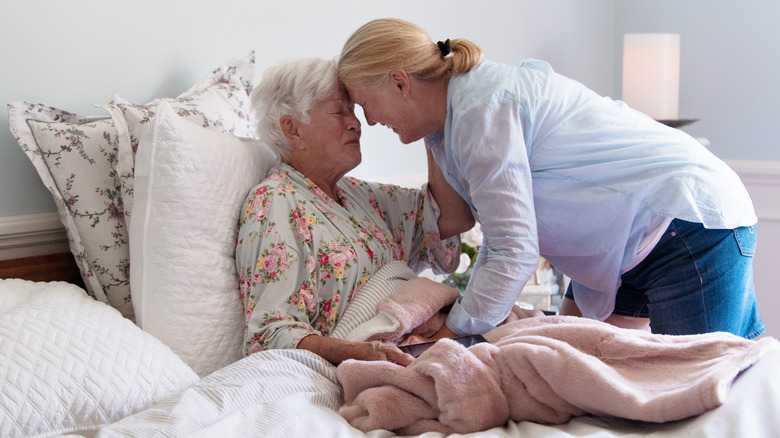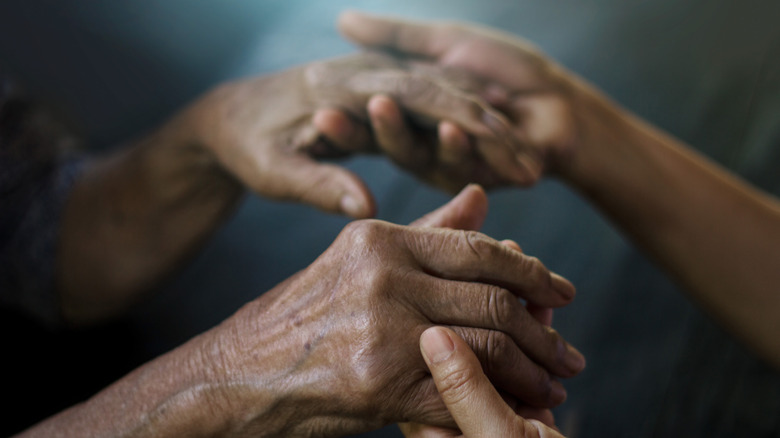End-Of-Life Signs That Are Actually Treatable
Dealing with the emotional, financial, and physical consequences of someone who is dying is hard on both the person who's near death and their friends and family members.
Although having meaningful conversations about the afterlife, mending broken relationships with people in this life, and spending time with loved ones can ease some of the suffering associated with end-of-life, what happens in the final moments before death can be heartbreaking to watch. Your loved one's breathing might slow down, they might drift in and out of consciousness, their body temperature might decrease, their interest in what's around them could fade, they might lose their appetite, and they will definitely not be able to move around as much. While some of these signs can be managed with extra blankets, pain medication, shifting their position in bed, and placing a bedside commode near them, there are still other things that happen with the dying person's health that are actually treatable.
For example, conditions like hypercalcemia (having high levels of calcium in the blood), kidney failure, infection, skin irritations, and side effects of pain medications can all be treated. Here's how.
Treating health concerns when someone is nearing death
Hypercalcemia is most common in people with advanced stages of cancer, particularly multiple myeloma and cancers related to the breast, lungs, and kidneys. It is thought to occur because of changes in the dying person's bones. Symptoms include fatigue, weakness, loss of appetite, nausea and vomiting, bone pain, feeling parched, increased peeing, constipation, confusion, delirium, sleepiness, and seizures. Treatment of the condition, first and foremost, includes adhering to the patient's last wishes of whether or not they want to be treated and following that up with consuming plenty of fluids (including intravenous fluids), stopping any supplements and medications that might be adding to the condition, and using bisphosphonate treatment to protect the bones from being destroyed faster than they can be rebuilt.
Kidney failure in someone close to death can be treated with dialysis or a kidney transplant. The latter is an option for someone who is well enough to handle it.
Infections are very possible in terminally ill patients, too, with sepsis being the most severe and life-threatening kind. While antibiotics could be used to treat the infection, again, the dying person's wish should be adhered to. Sepsis needs to be caught early if it's to be treated effectively as it can spread quickly throughout the body.
Some of the things that happen to your skin just before death can be treated too. Drying and itchy skin, in particular, can be relieved by regular moisturizing and keeping the area clean.
Pain medications can have unpleasant side effects like nausea, vomiting, and constipation. These can be treated with drugs to control the symptoms. That being said, not all treatable signs are physical.
Treating end-of-life depression and anxiety
Depression and anxiety can be a big part of someone's life when the end is near. They could be anxious about the dying process itself or they might be sad about broken relationships or the people they're leaving behind.
Terminal restlessness is another common sensation people feel at the end of life. Symptoms include agitation; confusion; emotional outbursts including anger and accusing loved ones of made-up wrongdoings; pulling on clothing, intravenous tubes, and bedding; and rejecting physical touch. Counseling, switching medications, and connecting with spiritual leaders can be part of how this is treated.
Mental health-related concerns when someone is near death can be challenging to deal with, especially if loved ones and healthcare professionals are not up to the task. If you're a loved one watching someone close to you who's dying who is also in emotional distress about their illness or death as a whole, consider spending time with them, being emotionally present with them, involving them in conversations, and providing physical affection. You can also try soothing their worries by playing comforting music and conversing with them about their concerns. Assisting them, practically, by putting their final affairs in order and helping them connect with anyone they may want to have final conversations with could also help greatly. Oftentimes, it is easy to see the more physical signs that require treatment and miss the more hidden forms of distress. Providing treatment that is holistic can ease both the physical and mental stressors related to dying.
If you or someone you know needs help with mental health, please contact the Crisis Text Line by texting HOME to 741741, call the National Alliance on Mental Illness helpline at 1-800-950-NAMI (6264), or visit the National Institute of Mental Health website.



